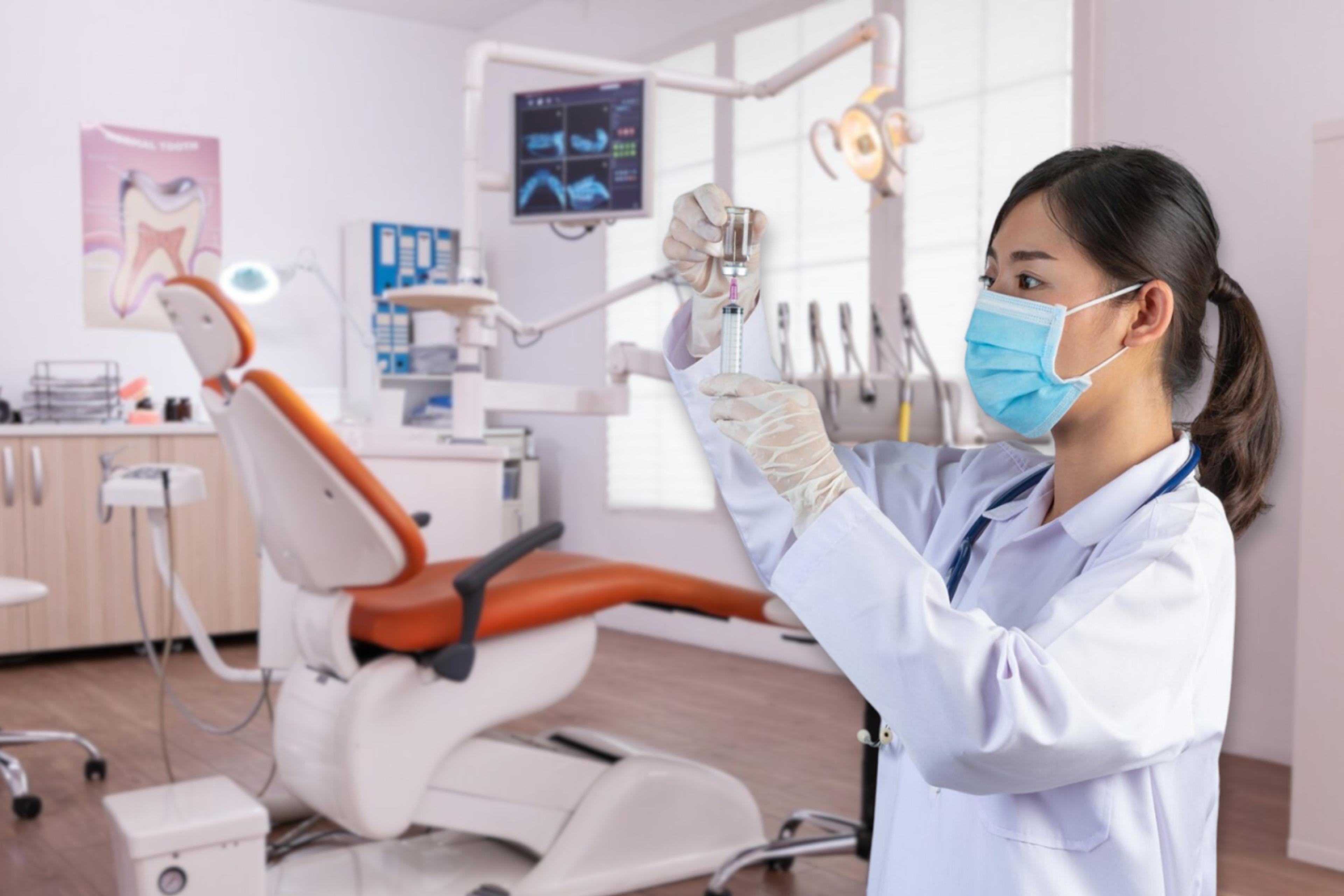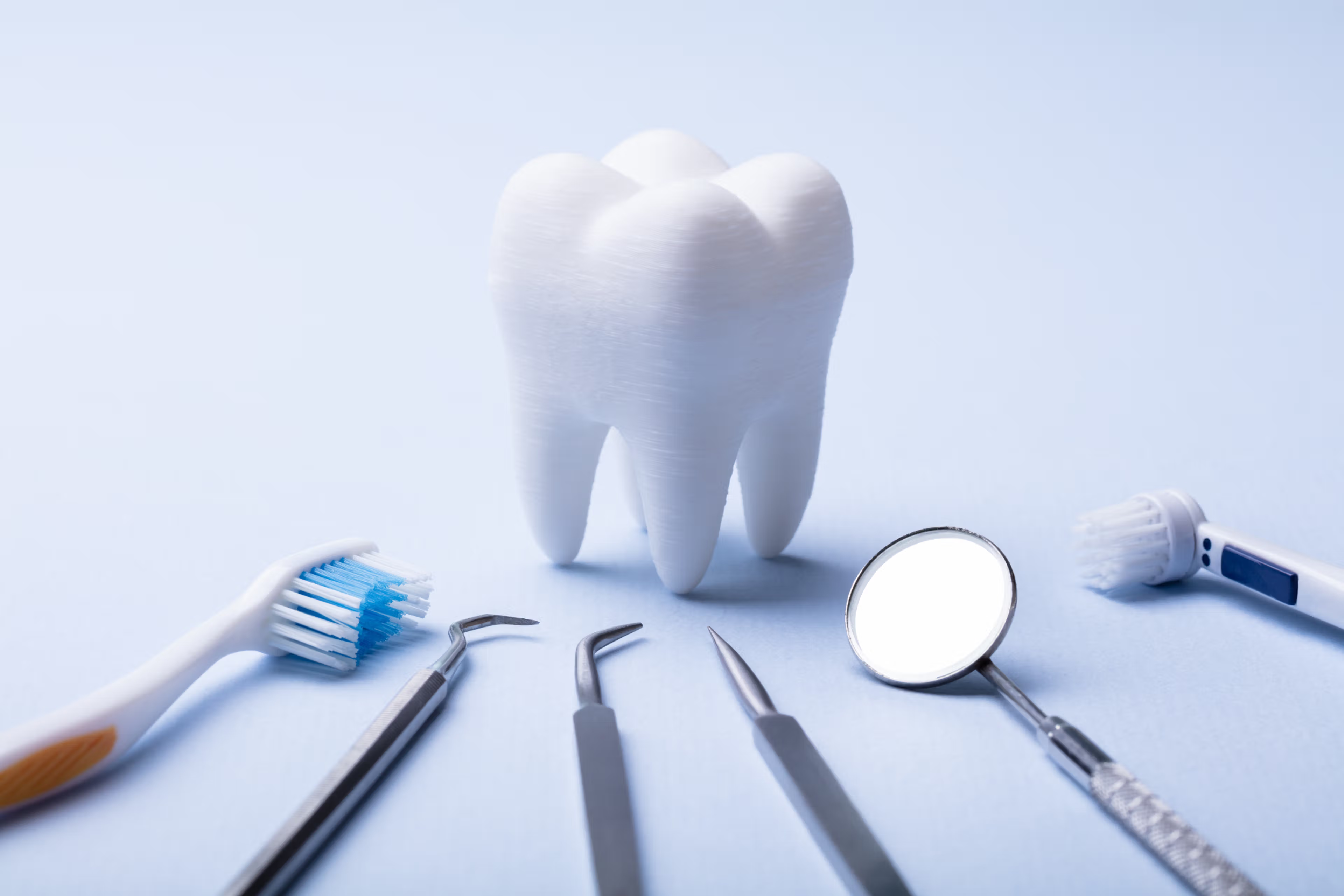Dental Anesthesiologist: Schooling, Career Path, & Salary
Learn the step-by-step process of becoming a dental anesthesiologist, from the required education and training to the essential skills and responsibilities of this specialized field.
Posted March 31, 2025

Table of Contents
A dental anesthesiologist is a specialized dentist who specializes in pain management and anesthesia for dental procedures. These professionals work in private practice, university hospitals, surgery centers, and children’s hospitals, assisting patients who experience high levels of anxiety or require advanced sedation for complex treatments. The American Dental Association (ADA) recognizes dental anesthesiology as a specialty, and becoming a dentist anesthesiologist requires years of training, clinical education, and anesthetic management experience.
This guide provides a step-by-step breakdown of the schooling, residency programs, career opportunities, and salary expectations for those interested in pursuing this path.

What is a Dental Anesthesiologist?
A dental anesthesiologist is a specialized dental professional trained in anesthesia care, pain management, and pain control for patients undergoing dental procedures, oral surgery, and maxillofacial surgery. Their expertise goes beyond local anesthesia, which is commonly used by general dentists, as they are qualified to administer moderate sedation, general anesthesia, and advanced sedation techniques.
These professionals play a critical role in patient safety, ensuring individuals with severe dental anxiety, special needs, or complex medical conditions can receive the necessary dental care without distress or complications. Their work is especially important for patients who:
- Have extreme dental phobia or anxiety control issues.
- Require advanced sedation due to extensive surgical treatment needs.
- Are undergoing oral and maxillofacial surgery procedures, such as wisdom tooth extractions, corrective jaw surgery, or dental implant placement?
- Have medical conditions (e.g., cardiovascular disease, diabetes, or neurological disorders) that make anesthesia administration more complex.
- Have developmental disabilities or conditions like autism spectrum disorder, which may make standard dental treatment challenging.
Key Responsibilities
Dental anesthesiologists handle all aspects of anesthetic management, from preoperative assessment to post-procedure recovery. Their work requires extensive training in pain control, anesthesia services, and patient care to ensure patient safety and effective outcomes.
1. Administering Anesthesia for Dental Procedures
- Providing local anesthesia, moderate sedation, general anesthesia, and advanced sedation.
- Adjusting sedation levels based on the complexity of the dental procedure and the patient’s medical history.
- Using specialized techniques for pediatric patients, elderly patients, and individuals with special healthcare needs.
2. Monitoring Patient Safety and Vital Signs
- Ensuring patients remain stable throughout the procedure.
- Monitoring heart rate, blood pressure, oxygen levels, and breathing patterns to prevent complications.
- Managing airway protection techniques, including intubation, when necessary.
3. Managing Pain Control for Complex Dental Cases
- Providing anesthesia for patients undergoing oral and maxillofacial surgery, wisdom tooth extractions, dental implant surgery, and jaw reconstruction.
- Offering solutions for postoperative pain management, including regional nerve blocks and non-opioid pain relief strategies.
- Working with oral surgeons, general dentists, and medical professionals to tailor pain control approaches based on patient needs.
4. Working in Diverse Clinical Environments
Dental anesthesiologists provide anesthesia in various settings, including:
- Hospitals – Assisting with complex oral and maxillofacial surgery cases in university hospitals, such as Stony Brook University Hospital.
- Surgery Centers – Providing anesthesia for outpatient surgical procedures requiring advanced pain management.
- Private Practice – Partnering with general dentists and oral surgeons to offer sedation services for dental patients with high anxiety.
- Children’s Hospitals – Specializing in pediatric dental anesthesia for young patients undergoing dental procedures.
5. Educating and Training Future Dental Professionals
- Teaching dental students about anesthetic management in dental school.
- Supervising dental anesthesiology residents in dental anesthesiology programs.
- Conducting research and publishing case reports to improve anesthesia techniques.
Dental anesthesiologists are essential to modern dentistry, ensuring that patients receive pain-free, stress-free, and safe dental treatment. Their role bridges dentistry, medicine, and anesthesiology, making them a valuable asset in dental care and surgical procedures.

Educational Pathway to Becoming a Dental Anesthesiologist
Becoming a dental anesthesiologist requires extensive education and clinical training. The path includes completing an undergraduate degree, earning a DDS or DMD in dental school, and completing a dental anesthesiology residency program. The process typically takes 11 to 12 years, depending on specialization and training opportunities.
Undergraduate Education
Becoming a dental anesthesiologist requires extensive education and clinical training. The path includes completing an undergraduate degree, earning a DDS or DMD in dental school, and completing a dental anesthesiology residency program. The process typically takes 11 to 12 years, depending on specialization and training opportunities. While no specific major is required, most dental students choose fields that strengthen their scientific background and clinical education. Competitive applicants often major in:
- Biology
- Chemistry
- Biomedical Sciences
- Health Sciences
Many dental schools have prerequisite courses, typically including:
| Required Courses | Typical Credits |
|---|---|
| Biology with lab | 8 credits |
| General Chemistry | 8 credits |
| Organic Chemistry | 8 credits |
| Physics | 8 credits |
| Mathematics (Statistics or Calculus) | 3–6 credits |
| English/Writing | 6 credits |
Dental School
After earning an undergraduate degree, students must complete four years of dental school to earn a Doctor of Dental Surgery (DDS) or Doctor of Dental Medicine (DMD). These degrees are equivalent and focus on foundational dentistry, oral surgery, and patient care.
Dental School Curriculum
Students undergo both classroom learning and clinical training, covering:
| Core Subjects | Key Areas of Study |
|---|---|
| General Dentistry | Diagnosis, prevention, and treatment of dental diseases |
| Oral and Maxillofacial Surgery | Tooth extractions, dental implants, jaw surgery |
| Pain Management & Local Anesthesia | Administration of local anesthesia, moderate sedation, and advanced sedation |
| Patient Care & Anxiety Control | Managing dental anxiety and special needs patients |
| Emergency Medicine & Trauma Management | Treating dental emergencies in hospital and clinic settings |
Dental Licensure
Upon completing dental school, students must pass either:
- National Board Dental Examination (NBDE) (Part I & II) – Phased out by 2022.
- Integrated National Board Dental Examination (INBDE) – The current exam format.
Dental Anesthesiology Residency Program
Graduates of dental school must complete a dental anesthesiology residency program accredited by the Commission on Dental Accreditation (CODA). This postdoctoral training lasts approximately three years and includes extensive training in anesthetic management.
Residency Program Rotations
After dental school, candidates must complete a dental anesthesiology residency program accredited by the American Dental Board of Anesthesiology (ADBA). These residency programs last 36 months and include extensive clinical training in surgical procedures, critical care medicine, and internal medicine.
The Rotations in a Dental Anesthesiology Residency
- Emergency medicine – Training in hospitals to manage trauma patients.
- Internal medicine – Learning the effects of anesthesia on medically complex patients.
- Critical care medicine – Managing pain control and sedation in intensive care units.
- Surgical procedures – Working with oral surgeons to provide anesthesia for complex cases.
Notable Dental Anesthesiology Residency Programs:
- Stony Brook University Hospital – A leading program with training in anesthesia care, pain control, and patient safety.
- Pittsburgh School of Dental Medicine – Offers rotations in university hospitals and surgery centers.
- Illinois Masonic Medical Center – Focuses on advanced sedation techniques and clinical education.
During residency, dentists gain experience providing anesthesia services for a range of dental procedures and training in advanced sedation techniques. The residency prepares them for board certification through the American Dental Board of Anesthesiology.
Board Certification & Licensing
After completing a dental anesthesiology residency, professionals can apply for board certification through:
- American Dental Board of Anesthesiology (ADBA)
- National Dental Board of Anesthesiology (NDBA)
Once certified, they can work in hospitals, private practice, and surgery centers, administering anesthesia services for a wide range of dental patients.
Career Path and Work Environments
A dental anesthesiologist plays a critical role in patient safety, pain control, and anesthetic management during complex dental procedures. Their work is essential in both surgical and non-surgical settings, providing specialized anesthesia care for patients who require moderate sedation, general anesthesia, or advanced sedation due to medical conditions or dental anxiety. Unlike general dentists, who administer local anesthesia for routine procedures, dentist anesthesiologists have specialized training to manage high-risk patients, including pediatric and special needs patients, those with severe dental disease, and individuals undergoing oral and maxillofacial surgery.
Where Do Dental Anesthesiologists Work?
1. University Hospitals
Dental anesthesiologists working in university hospitals collaborate with clinical professors, program directors, and research teams to advance the field of dental anesthesiology. Their responsibilities include:
- Providing anesthesia care for complex oral and maxillofacial surgery cases.
- Supervising dental anesthesiology residents during clinical education and training.
- Participating in research and publishing case reports on pain control and anesthetic management.
- Teaching dental students about advanced sedation techniques.
2. Private Practice
Many dental anesthesiologists choose private practice because of its flexibility and earning potential. In this setting, they:
- Work alongside general dentists, oral surgeons, and prosthodontists to provide moderate sedation and general anesthesia.
- Offer specialized anesthesia services for patients with dental anxiety or complex medical conditions.
- Manage pain control for patients undergoing oral surgery, dental implants, and jaw reconstruction.
- Run mobile anesthesia practices, traveling to different dental clinics to assist with surgical procedures.
3. Children’s Hospitals
Pediatric anesthesia is a major focus in dental anesthesiology, as young patients often require advanced sedation due to severe dental disease, special needs, or medical conditions. In a children’s hospital, a dental anesthesiologist:
- Provides anesthesia care for young patients undergoing dental procedures.
- Works with pediatric dentists, oral surgeons, and hospital anesthesiologists.
- Ensures patient safety and comfort, particularly for those with conditions such as autism, cerebral palsy, or congenital disorders.
4. Surgery Centers
Surgery centers offer another career path for dentist anesthesiologists, particularly those specializing in maxillofacial surgery and complex dental procedures. Responsibilities include:
- Administering general anesthesia for oral and maxillofacial surgery cases.
- Managing pain control and postoperative anesthetic management.
- Providing advanced sedation for patients undergoing bone grafting, jaw surgery, and dental implant placement.
Job Responsibilities
A dental anesthesiologist works closely with oral surgeons, general dentists, pediatric specialists, and medical professionals to ensure safe and effective anesthesia care. Their role includes:
1. Providing Anesthesia for Oral Surgery and Dental Procedures
- Administering local anesthesia, moderate sedation, and general anesthesia for patients undergoing surgical procedures.
- Managing pain control during oral surgery, maxillofacial surgery, and other invasive treatments.
- Adjusting anesthesia levels to accommodate patient needs and medical conditions.
2. Managing Anesthesia Care in Pediatric and Adult Patients
- Developing customized anesthesia plans for pediatric and adult patients.
- Monitoring vital signs and adjusting sedation levels for high-risk patients.
- Providing anesthesia services for patients with severe dental anxiety, heart disease, neurological conditions, and respiratory disorders.
3. Teaching and Mentoring Dental Anesthesiology Residents
- Supervising dental anesthesiology residents in dental anesthesiology programs.
- Educating dental students on anesthesia techniques and patient safety.
- Conducting clinical education and research on pain management.
4. Working in Emergency and Critical Care Settings
- Responding to anesthesia-related emergencies in hospitals and surgery centers.
- Managing sedation for trauma patients in emergency medicine settings.
- Assisting in critical care medicine, particularly for patients with complex medical histories.
Dental Anesthesiologist Salary and Job Outlook
A career in dental anesthesiology is financially rewarding, with high earning potential and a growing demand for anesthesia services in dental medicine. According to the American Dental Association, salaries vary based on factors such as experience, geographic location, and work environment, but professionals in this field consistently earn well above the average for general dentists.
Dental Anesthesiologist Salary
According to the American Dental Association (ADA), the average salary for a dental anesthesiologist is $302,970 per year. Earnings are influenced by experience, type of practice, and whether the anesthesiologist works in private practice, hospitals, surgery centers, or academic institutions.
Salary by Work Setting
| Work Setting | Average Salary |
|---|---|
| Private Practice | $350,000+ |
| University Hospital | $250,000 - $300,000 |
| Surgery Centers | $280,000 - $320,000 |
| Children’s Hospital | $275,000 - $310,000 |
Factors That Affect Salary
Experience Level
- Entry-level professionals earn around $200,000 - $250,000 annually.
- Experienced anesthesiologists with 5+ years of practice can make over $350,000, especially in private practice.
Geographic Location
- Urban areas with high patient demand often offer higher salaries.
- Rural areas may have fewer specialists, increasing earning potential due to lower competition.
Type of Employment
- Those in private practice tend to earn more than those in university hospitals due to self-employed business models.
- Hospital-based anesthesiologists earn competitive salaries but may have stricter schedules and responsibilities.
Specialization and Additional Training
- Pediatric anesthesia specialists or those with advanced sedation certifications can command higher salaries.
- Professionals working in surgery centers and children’s hospitals may have additional incentives.
Demand for Dental Anesthesiologists
Increased Awareness of Pain Control in Dentistry
- More patients and dentists prioritize pain management and anxiety control in dental treatment.
- Growing acceptance of moderate sedation and general anesthesia in oral surgery and complex dental care.
Expanding Dental Anesthesiology Programs
- More dental anesthesiology residency programs are being established, such as those at Stony Brook University Hospital, Pittsburgh School of Dental Medicine, and Illinois Masonic Medical Center.
- Increasing need for trained dental anesthesiology residents to meet patient demand.
Rising Number of Patients Needing Advanced Sedation
- Aging populations require more complex dental procedures that necessitate anesthesia services.
- Pediatric and special needs patients increasingly need advanced sedation for safe and effective dental care.
Greater Availability of Anesthesia Services in Outpatient Settings
- More surgery centers and dental clinics now offer anesthetic management for dental procedures that previously required hospitalization.
- Increased use of mobile anesthesia services allows dental anesthesiologists to provide pain control across multiple clinics.
Projected Job Growth
- The Bureau of Labor Statistics (BLS) projects continued growth in dental anesthesiology, paralleling trends in oral and maxillofacial surgery and general anesthesiology.
- The need for dental anesthesiology residents and clinical professors will increase as more training programs develop.
Career Stability and Future Opportunities
A career in dental anesthesiology offers long-term stability due to high demand, strong salaries, and growing patient needs. Specialization can further expand career opportunities by:
- Specializing in pediatric or hospital-based anesthesia
- Training future dental anesthesiology residents in university hospitals
- Establishing private practice anesthesia services
- Contributing to research and innovation in pain management and sedation techniques
Challenges and Considerations for Becoming a Dental Anesthesiologist
Competition for Residency Programs
Limited Availability of Dental Anesthesiology Residency Programs
Dental anesthesiology residency programs are highly competitive, with only a few accredited programs in the U.S. Each year, these programs accept a limited number of residents, making it difficult for many applicants to secure a spot.
| Residency Program | Number of Spots Available Annually |
|---|---|
| Stony Brook University Hospital | 4 |
| Pittsburgh School of Dental Medicine | 4 |
| Illinois Masonic Medical Center | 4 |
What Makes a Competitive Applicant?
Successful candidates for dental anesthesiology residency must demonstrate:
- Strong academic performance in dental school, including high-class rankings and board scores.
- Research experience, particularly in pain control, anesthesia services, or dental medicine.
- Clinical education and hands-on exposure to surgical procedures.
- Letters of recommendation from faculty members and practicing dentist anesthesiologists.
The limited availability of residency programs makes early preparation essential for aspiring dental anesthesiology residents.
Extensive Training and Licensing
Long Educational Commitment
Becoming a dental anesthesiologist requires over a decade of training, including:
- 4 years of undergraduate education
- 4 years of dental school
- 3 years of a dental anesthesiology residency program
In total, 11 to 12 years of education and training are required before becoming fully licensed to practice dental anesthesiology.
Board Certification and Licensure
To practice, dental anesthesiologists must complete licensing and certification requirements, including:
- Passing the National Board Dental Examination (NBDE) or Integrated National Board Dental Examination (INBDE).
- Completing CODA-accredited residency training.
- Obtaining board certification from the American Dental Board of Anesthesiology (ADBA).
The licensing process is rigorous, requiring knowledge of anesthetic management, pain control, patient safety, and emergency medicine.
Decision-Making in Anesthetic Management
Managing High-Risk Patients
Dental anesthesiologists often work with patients who have complex medical conditions, including:
- Cardiovascular disease
- Respiratory conditions (e.g., asthma, COPD)
- Neurological disorders (e.g., epilepsy, Parkinson’s disease)
- Pediatric patients with special needs
Making real-time decisions about anesthetic levels, sedation techniques, and pain control is crucial to ensure patient safety.
Handling Anesthesia-Related Emergencies
Anesthesia administration carries inherent risks, including:
- Airway obstruction
- Anaphylactic reactions
- Cardiac or respiratory distress
- Anesthesia awareness
Dentist anesthesiologists must respond quickly in emergencies, requiring extensive training in critical care medicine and emergency medicine.
Legal and Ethical Responsibilities
Anesthesiologists are responsible for ensuring that patients receive safe and effective anesthesia care. They must:
- Follow strict protocols to minimize risks.
- Maintain up-to-date knowledge of pain management and anesthetic techniques.
- Ensure compliance with state and national medical regulations.
Bottom Line
A career in dental anesthesiology, including dental anesthesiology programs, is rewarding and financially competitive. The demand for trained professionals continues to grow in hospitals, private practice, and surgery centers. Those who complete the required schooling, residency programs, and advanced training can expect a stable career with opportunities for specialization in pain management, oral surgery, and anesthesia services. A career in dental anesthesiology requires commitment, extensive training, and the ability to handle high-pressure situations. The field offers strong salaries, job security, and the opportunity to improve patient well-being, but the challenges of residency competition, long training periods, and anesthetic management responsibilities should not be overlooked. Those considering this path should start preparing early, gain relevant clinical experience, and develop strong decision-making and critical thinking skills.
The path to becoming an anesthesiologist starts with getting into the right medical school. A strong application, high MCAT scores, and well-crafted personal statements can make all the difference. Medical School Admissions Coaches are experienced professionals who have helped countless students gain acceptance into top medical school programs.
Related Articles
- Preparing for Medical School: A Comprehensive Guide
- How Long Does It Take to Become a Doctor? A Comprehensive Guide
- How to Become an Anesthesiologist: Education, Training, and Career Path
- The Best Medical Schools for Anesthesiology
FAQs
How long does it take to be a dental anesthesiologist?
- Becoming a dental anesthesiologist takes approximately 11 to 12 years. This includes four years of undergraduate education, four years of dental school to earn either a Doctor of Dental Surgery (DDS) or a Doctor of Dental Medicine (DMD), and three years of a dental anesthesiology residency program. After completing training, graduates must pass board certification exams to practice independently.
What type of anesthesiologist gets paid the most?
- Among all anesthesiology specialties, physician anesthesiologists who specialize in pain management and cardiothoracic anesthesia tend to have the highest salaries. In the dental field, dental anesthesiologists working in private practice typically earn the most, with salaries exceeding $350,000 per year. Those working in university hospitals, children’s hospitals, or surgery centers usually earn slightly less due to the nature of their work setting.
Do dental anesthesiologists make a lot of money?
- Yes, dental anesthesiologists are among the highest-paid dental specialists. The average dental anesthesiologist's salary is approximately $302,970 per year, but earnings vary based on experience, location, and work setting. Those in private practice often earn more than $350,000 annually, while those employed by hospitals and surgery centers typically earn between $250,000 and $320,000. The salary reflects the specialized training, high level of responsibility, and demand for anesthesia services in dental medicine.
Are dental anesthesiologists in demand?
- The demand for dental anesthesiologists is growing as more patients and dental professionals recognize the importance of pain control and anxiety management in dental medicine. An increasing number of patients require advanced sedation for complex procedures, which has led to the expansion of dental anesthesiology programs. More outpatient dental settings, including surgery centers and specialty clinics, are offering anesthesia services, further increasing the need for trained dental anesthesiologists.










